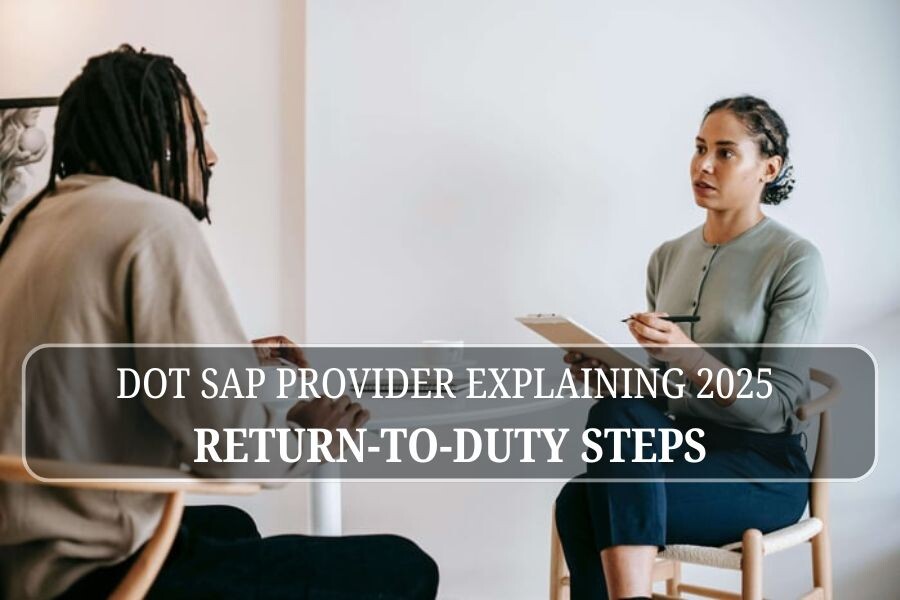Introduction: Understanding the SAP Evaluation Process in 2025
If you’ve failed or refused a DOT drug or alcohol test, you’re likely being told you need to complete a SAP evaluation before returning to work. But if this is your first DOT violation, the process can seem overwhelming and confusing.
So, what exactly does a SAP evaluation involve, and why is it critical in 2025?
This guide covers everything first-time offenders need to know—step-by-step—so you can regain DOT compliance, clear your FMCSA record, and return to work safely and legally.
What Is a SAP Evaluation and Why Is It Required?
A SAP Evaluation (Substance Abuse Professional Evaluation) is a process outlined under 49 CFR Part 40 of DOT regulations. It’s mandatory when a DOT-regulated employee:
- Tests positive for drugs or alcohol
- Refuses a DOT drug/alcohol test
- Violates DOT testing protocol in any way
Its purpose is to determine your readiness to safely return to duty after a violation.
Who Needs to Complete a SAP Evaluation?
You must complete a SAP evaluation if you work in any safety-sensitive position regulated by DOT agencies such as:
- FMCSA – CDL drivers
- FAA – Pilots
- FRA – Railroad operators
- PHMSA – Hazmat workers
- FTA – Transit drivers
- USCG – Maritime employees
🚛 For CDL drivers, this evaluation is a mandatory step before regaining your license status in the FMCSA Clearinghouse.
Steps of the SAP Evaluation Process
Step 1: Initial Evaluation
- Review of your DOT violation
- Personal substance use history
- Mental health screening
- Treatment or education plan is developed
📋 The SAP files a report and updates the FMCSA Clearinghouse, triggering your Return-to-Duty (RTD) process.
Step 2: Follow-Up Evaluation
- Confirms you completed required treatment/education
- SAP grants RTD eligibility
- Employer sets up at least 6 follow-up tests in the next 12 months
What Might the SAP Recommend?
Your SAP may refer you to one or more of the following:
- Educational classes
- Counseling sessions
- Outpatient treatment
- Inpatient rehab
- 12-step programs
Recommendations are customized and must be completed before the RTD process can resume.
Typical Timeline for SAP Evaluations in 2025
| Treatment Type | Estimated Duration |
|---|---|
| Education only | 5–10 business days |
| Outpatient counseling | 2–4 weeks |
| Inpatient treatment | 30+ days |
⏱️ Most delays happen when drivers postpone or skip treatment.
What Does a SAP Evaluation Cost in 2025?
Costs vary, but here’s what you can expect:
- Initial Evaluation: $300 – $450
- Follow-Up Evaluation: $100 – $250
- Treatment Costs: Varies (some covered by insurance)
💡 Costs are typically out-of-pocket unless your employer agrees to pay.
Consequences of Skipping the SAP Process
If you ignore the SAP evaluation requirement:
- You cannot legally work in any DOT-regulated position
- FMCSA status will be marked as “Prohibited”
- Employers must deny safety-sensitive employment offers
Privacy: Is Your SAP Evaluation Confidential?
Mostly. Here’s what’s shared:
- SAP status and RTD eligibility is updated in the Clearinghouse
- Employers receive basic reports
- Your treatment details remain confidential
🔒 Your compliance is visible. Your medical history is not.
Choosing a Trusted SAP Provider
Pick a provider who is:
- Registered with DOT and FMCSA
- Offers telehealth evaluations
- Provides fast, written documentation
- Familiar with return-to-duty timelines
👉 Schedule your evaluation with AACS Counseling – serving all 50 states with same-day support.
Conclusion: Get Back to Work with Confidence
A SAP evaluation is more than a formality—it’s a structured process to prove you’re ready to return to duty. With the right support, even first-time offenders can navigate it smoothly in 2025.
📞 Need help now? Contact AACS Counseling to book your same-day SAP evaluation.
